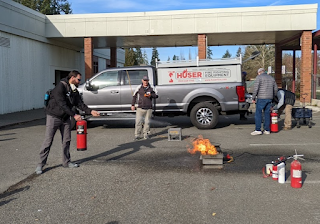Safety Part 1: Safety at Sea Course
After a long pandemic break, The Sailing Foundation held their popular Safety at Sea course again this year, and Dave and I were lucky enough to attend. As a hybrid training with US Sailing, students take a 15-part online course in sea safety essentials before attending a 10-hour hands-on training. Because these certificates are required to skipper specific offshore races (e.g. PNW Offshore, Vic-Maui, and Pac Cap), we've found limited spots are open to offshore cruisers. It's best to get on the waitlist ahead of time.
Online Course:
The online course includes chapters on the following topics:
- giving assistance to vessels in danger
- personal safety gear
- vessel safety gear
- crew overboard
- first aid at sea
- communication with rescue agencies during an emergency
- cold exposure
- search and rescue
- weather resources offshore
- signals
- fire safety
- heavy weather sailing
- storm sails
- damage control for vessel emergencies (demasting, rudder loss, water ingression, etc.)
- abandoning ship
Personally, I wished the weather chapter and drag devices part were covered more in depth; however, this just highlighted the gaps in my knowledge and motivated me to seek out additional information outside the course. It would be impossible to meet everyone where they're at given the breadth of topics covered and the wide range of prior knowledge.
In-Person Seminar:
The online course serves as a prerequisite for the in-person seminar. Ours was located at Bainbridge Island High School in mid-February (brr!). By meeting in person, we could practice hands-on skills to make an in-water emergency feel more real.
To curb the spread of Covid, all participants had to show proof of full vaccination and wear masks indoors. The exception to the mask rule was in the pool, but organizers mitigated the risk by screening participants and teaching individual skills rather than group ones.
Though only one day, the course felt full. We threw crew overboard devices to practice accuracy, inspected flares, adjusted our inflatable lifejackets while in the pool, righted life rafts and climbed in them fully clothed in the pool, wrapped injuries, and put out controlled fires. And maybe it's the humdrum of the pandemic talking, but this course was FUN. Maybe I devoted all my pandemic aggression into that fire extinguisher trigger and it felt great.
 |
| In-person inspection of life jackets |
 |
| I didn't get any pictures of our work in the pool but don't worry, I made a realistic rendition. |
Final Thoughts:
The most important takeaway for me was confidence. I know that instead of panicking during an emergency, I can focus on what I can do. Even in the worst nightmare scenarios, I know we have options, and that empowerment is priceless.
It would be too hard to cover every lesson learned or reviewed in one blog post, so we simply recommend this course, or a similar one, for any mariner wishing to go offshore. If you can't get your hands on the hands-on seminar or the cruising kitty won't allow the cost, the online sections alone would be a worthwhile option. In all lessons, we were thankful for the reinforcement of practical skills and introduction of new ones.
Regardless, wear a functioning lifejacket with leg straps, tether in, don't take chances, maintain and practice using all your gear, and prepare for any emergency out on the water.





The course sounds like it was amazing!!
ReplyDelete